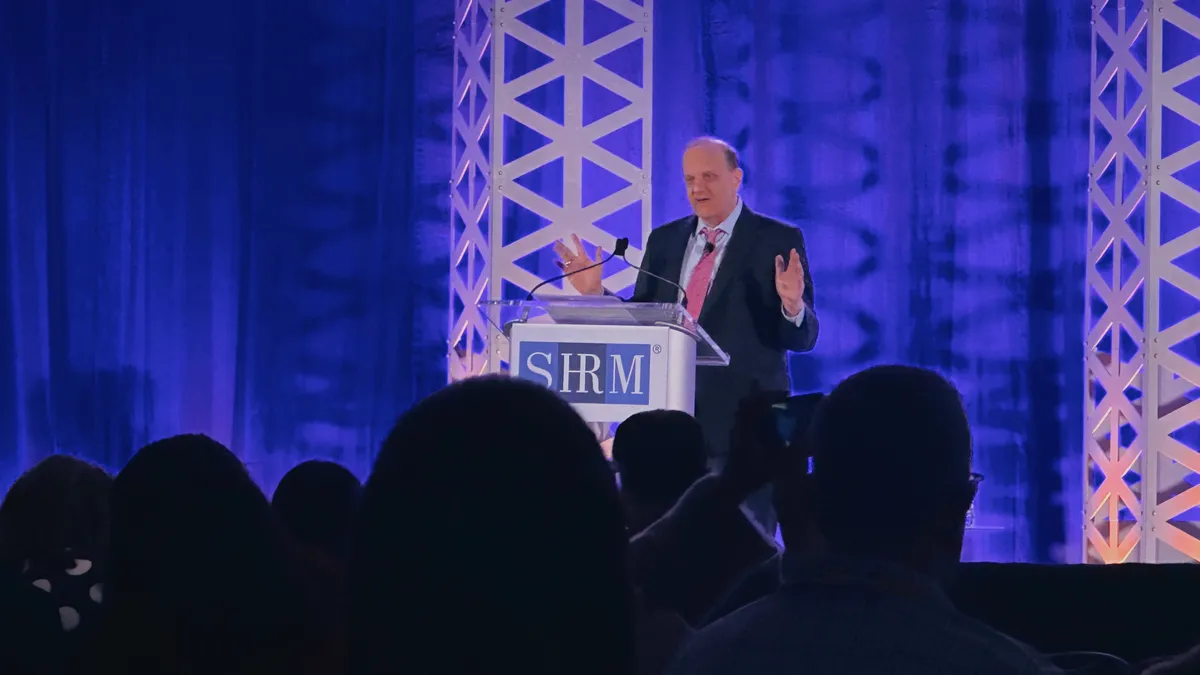WASHINGTON — Jonathan A. Segal’s Monday session at a Society for Human Resource Management conference was full of cognitive dissonance. Amid anecdotes about the discrimination and disenfranchisement that had harmed his family, he kept the crowd engaged in an important discussion about the true nature of antisemitism.
Antisemitism is, at its core, hatred, but it’s more complicated than just that. The SHRM speaker, a partner at Duane Morris LLP in the Employment, Labor, Benefits and Immigration Practice group, emphasized that antisemitism these days manifests as conspiracy theories and history denial.
After challenging his audience to assess whether certain statements counted as anti-Jewish workplace harassment, Segal underscored that sometimes antisemitism can take the form of so-called “positive stereotypes.” This is a term he deemed oxymoronic, with stereotypes only being “positive” in the way model minority myths are meant to be for Asian Americans and Pacific Islanders.
Segal emphasized that antisemitism is hostility, prejudice or hatred for Jewish people. “I didn't say the Jewish religion; I said the Jewish people,” he said. “Most antisemitism is geared at people because of their being Jewish, not necessarily because of their religious practices.”
The Jewish employee experience and combating prejudices therein is a matter of both DEI and compliance.
on antisemitism at work — @Jonathan_HR_Law is digging into the psychology behind hate directed toward jewish (and sometimes even non-jewish people). it’s a conspiracy theory, he explained. pic.twitter.com/AgcXE0yVKA
— caroline (they/them) ⭒ (@bigbosscaro) February 27, 2023
While physical acts of violence do exist and continue to occur, Segal brought rhetorical hate center stage. “What happened in Nazi Germany didn’t start with the camps. It started with words,” he said.
Some such hate has made headline in recent years, like comments from from Kanye West, the rapper now known as Ye. Shortly after Ye’s disparaging tweets and Instagram statements set the internet ablaze in October 2022, neo-Nazi group Goyim Defense League hung a banner reading “Kanye Is Right About the Jews” over a Los Angeles highway.
Segal mentioned in passing an Anti-Defamation League snapshot between May 7 and May 14, 2021, that captured more than 17,000 tweets saying “Hitler was right” or some variation of the phrase. “More scary to me than 17,000 retweets were the people that were agreeing quietly,” he said.
A prevailing part of the SHRM speaker’s messaging was the groundswell of anti-Jewish sentiment. Data suggests that this wave has shot up exponentially over the past three years — and that has a direct impact on employee experience.
“We hear a lot about the importance of ‘being your authentic self’ and bringing yourself to work,” Segal said. But increasingly, Jewish people are uncomfortable showing up in certain public areas as themselves, he said.
Worth noting is a 2019 survey by the American Jewish Committee, which suggested that 25% of Jews avoid certain scenarios or events due to worries about safety or comfort. Per AJC’s 2020 report, that number jumped to 31%. What changed? COVID-19 may have inadvertently provided a petri dish for antisemitism.
The onset of the COVID-19 pandemic and subsequent conspiracy theories led to a rekindling of anti-Jewish attitudes — something Segal has noted in past SHRM conferences. And as previously cataloged by HR Dive, blaming Jewish individuals for disease and disaster has long been conspiracy theorists’ game.
some nuance that jonathan segal added: antisemitism is not necessarily hatred toward the jewish religion, but jewish PEOPLE. and their heritage. and perceptions about their status as “less-than” but still “largely” in power. #shrmelcc
— caroline (they/them) ⭒ (@bigbosscaro) February 27, 2023
The ADL has cataloged this rise in antisemitism, recording increasing levels of hate since 2014. In 2023, 85% of Americans said they believe at least one antisemitic trope, per ADL’s report. In 2019, the rate was 61%. Likewise, 20% of Americans said they believe six or more anti-Jewish tropes, up from 11% in 2019.
It’s worth noting that the ADL has been cataloging American attitudes toward Jewish people and Israel since 1964; in its 2023 report, researchers highlighted that the reported level of antisemitism was the highest in decades. The last time ADL measured it being as high was 1992, surpassed only by 1964 (29%).
The organization has long gauged belief in tropes such as Jews “have too much power in the business world” or that they “stick together more than other Americans” (70% of respondents in the January report expressed this belief). A key workplace insight: 53% said they believe Jews “go out of their way to hire other Jews.”
Talent acquisition continues to be a battleground for antisemitism. In a 2022 survey, about 1 in 4 hiring managers told job site ResumeBuilder they’re less likely to hire Jewish applicants.
EMBED TWEET: https://twitter.com/bigbosscaro/status/1630236820964352001
“I wear my grandmother’s chai [חי] and my grandfather's ring, too,” Segal said, explaining that חי means “life” in English. (More familiar may be the Jewish toast “L’chaim!” that translates as “To life!”) Usually, he told the SHRM conference audience, he wears the symbol beneath his shirt.
“But for today, I'm not going to cower [about] who I am. I say that with pride — maybe a drop of defiance,” he added. “Yet, I also know I'm standing in a place that feels very safe. If I were some places, you can bet I would make the decision to put this away.”
HR’s role, the session implied, was to create the kind of atmosphere Segal felt at SHRM’s conference: one where Jewish employees could show up as their authentic selves and don’t count work as one of their sites for self-erasure.
Including Jewish talent in DEI spotlights and standing up an interfaith ERG were solutions discussed in the session. But HR pros can keep in mind that antisemitism isn’t a distant concern that won’t affect their company: referring to the 2017 Unite the Right rally in Charlottesville, Virginia, Segal said, “When you look at the guy who’s a tiki torch marcher, there’s a word for him: employee.”





















